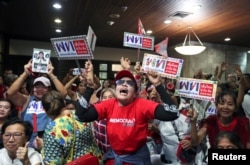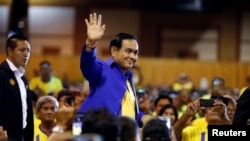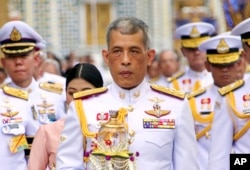Thailand is waving goodbye to its longest period of military rule in nearly 50 years — with a sweaty hand.
The elections March 24, the first since the 2014 military coup, that ousted a populist prime minister have ushered in anything but an end to power struggles. As political parties jockey to form a ruling coalition, the absence of a commanding winner is thwarting hope for a strong democratic government, analysts say.
The military-backed Palang Pracharath Party, which aims to keep Prime Minister Prayut Chan-o-cha in office, gained an estimated 117 seats in the 500-member House of Representatives. Palang Pracharath trailed rival Pheu Thai Party, which won approximately 137 seats.
But Pheu Thai has been unable to assemble a decisive majority coalition because several smaller parties have said they will not formally commit to join with either of the leading parties until the official election results are released May 9. Allegations of vote rigging and irregularities in vote counting led the Asian Network for Free Elections to call the Thai vote “deeply flawed.”
Although the vote counting has been completed, confirmation is pending.
“Whether you are a policymaker or a business person, the big picture here is muddy waters,” said Ernest Bower, a senior adviser for the Southeast Asia Program at the Center for Strategic and International Studies, during a seminar in Washington, D.C., last week. “It’s very hard to see where Thailand is going and to be very optimistic.”
Junta’s continued power
Rules written by the military acting as the National Council for Peace and Order (NCPO) are further complicating the political outcome. The all-powerful NCPO, wanting to ensure the junta’s continued power after the elections, created legal hurdles to mute challenges from anti-military groups.
For example, the unelected 250-member Senate, whose members are all appointed by the junta, is allowed to weigh in on the nomination for prime minister put forward by elected lawmakers in the lower chamber.
A committee headed by the current defense minister will pick members of the senate so senators would be hard-pressed to support a nomination from Pheu Thai, a party closely aligned with exiled former Prime Minister Thaksin Shinawatra, a telecommunications billionaire. He was ousted in another military coup in 2006; it was the government of his sister, former Prime Minister Yingluck Shinawatra, that Prayut overthrew in 2014.
Analysts say the political maneuvering in the coming weeks won’t provide Thailand with the strong government it needs to stay competitive in Southeast Asia, where it is the second-largest economy after Indonesia. Whoever emerges as the next prime minister will teeter on narrow margins over the opposition and suffer from a highly fragmented coalition, experts say.
Any coalition “will be a lame duck from day one,” said Prachak Kongkirati, a political science professor at Thailand’s Thammasat University. “The primary concern of this kind of government is its own survival. It will try to please every group and all factions, thus it will not be able to do a lot.”
Prayut may be able to recapture his post as prime minister, but his uncontested power is likely to ebb.
Military rule
His five-year tenure marks Thailand’s longest period of military rule since Field Marshals Sarit Thanarat and Thanom Kittikachorn took turns dominating the country’s executive branch. Their ascendance began with a coup in 1957, led by Sarit, and came crashing down in a bloody crackdown on the 1973 mass uprising under Thanom’s watch.
During Prayut’s administration, he exercised the constitution’s Article 44 to churn out more than 200 executive orders, according to iLaw, a Bangkok-based legal watchdog agency.
But this prolific record of acting arbitrarily won’t sit well in the parliamentary system where a prime minister will be open to scrutiny, analysts say. Article 44, in effect since 2014, gives the junta the power to take actions with legislative, executive and judiciary implications in maintaining national and economic stability and protecting the monarchy. When used under Article 44, the prime ministers actions are deemed final.
“In the parliament, you have to be able to work with other parties and factions within your party … and compromise,” said Professor Allen Hicken, a Southeast Asia specialist and political scientist at the University of Michigan. “That is not what army chiefs and coup leaders normally have to do.”
Hicken predicts any government cabinet under the new administration will be short-lived, a repeat of the unsettled period from 1980 to 1996, when Thailand’s highly fragmented politics meant cabinets lasted 18 months on average.
Should the Pheu Thai Party manage to establish a government, its coalition would have to find common ground for at least seven parties and their varying agendas. A similar effort by Palang Pracharath would require an equal amount of effort to build a majority bloc, given that 16 parties won seats in the elections.
“The most likely outcome is a majority government headed by Prayut,” Hicken said, citing the senate’s expected support as a major reason. “But it’s one that’s not likely to control a majority of the parliament. If it does it will be a bare majority. This is not a recipe for policy productivity and policy stability.”
With the expectation of ineffectiveness hanging over the next administration, the government may be vulnerable to an intervention by the military that wants to set up a new administration, as seen in many of Thailand’s previous coups. But Prachak from Thammasat University thinks the time isn’t ripe for another coup at the moment.
Upcoming coronation
He said the coronation of King Maha Vajiralongkorn May 4-6 is seen as an event that calls for calm and solidarity.
“Palang Pracharath still has some advantages in forming a coalition government. So there is no reason to stage a coup,” Prachak said.
When he came to power, Prayut justified toppling Yingluck Shinawatra’s government by saying the coup helped end a political and economic paralysis caused by deadly street protests.
His intervention broke the political deadlock and paved the way for major infrastructure projects, which will likely attract nearly $10 billion worth of investment this year, more than tripling that of 2018, said Somprawin Manprasert, chief economist of Bangkok-based Bank of Ayudhya Pcl.
Somprawin is hopeful that the Prayut administration’s long-term economic development strategy will continue, as required by law, no matter who becomes the next premier.
“This is different from the past. It institutionalizes policy implementation and development that are often halted by political instability,” he said.
Income inequality an issue
But Prayut has been criticized because of the rise in inequality. Falling global prices for commodities such as rubber are hurting many farmers. Media reports of a December 2018 Credit Suisse study showing the richest 1 percent of the Thai population controlled 66.9 percent of the nation’s total wealth, up from 58 percent two years earlier, told people what the growing inequality they had been sensing was real.
In its campaign, the Pheu Thai Party dented support for Prayut and Palang Pracharath, telling voters he bore responsibility for “exclusive wealth, expansive poverty” in the country.
Once the official results are announced, these economic pains could eventually spread into the streets and undermine the legitimacy of any second term for Prayut.
Economists said an unstable government may tempt its leader to apply cosmetic fixes like farm subsidy and cash giveaways to problems that will take lengthy and painstaking reforms to overcome.
Somprawin said that while it is possible for small players to become a powerful growth engine for the Thai economy such a change requires lower barriers to entry, greater access to fair lending and a level playing field.
“Chief among the reform agendas would be a creation of equal opportunities,” he said. “Does Thailand have that yet? I am not sure.”







